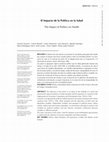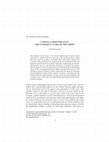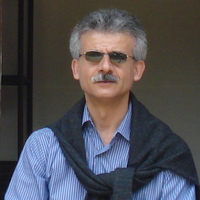Papers by Vicente Navarro

Salud Colectiva, 2007
RESUMEN El objetivo de este artículo es presentar los resultados principales del estudio que anal... more RESUMEN El objetivo de este artículo es presentar los resultados principales del estudio que analizó el impacto que tiene el poder político sobre la mortalidad infantil y la esperanza de vida en la mayoría de países de la Organización para la Cooperación y el Desarrollo Económico desde 1950 hasta 1998. Los países se agruparon según la tradición política que los había gobernado durante más tiempo a lo largo de los años 1950-1998. La mortalidad infantil y la esperanza de vida al nacer fueron las variables dependientes. Las variables independientes se agruparon en variables de poder político, mercado de trabajo, estado del bienestar y desigualdades de renta. Se presenta un análisis descriptivo de todas las variables según tradición política y también coeficientes de correlación de Pearson entre las variables para distintos períodos. La principal conclusión del estudio es que la duración de los gobiernos de partidos proredistributivos desempeña un papel importante en la reducción de las desigualdades de renta y en la disminución de la mortalidad infantil.

Monthly Review, 1991
As you may have noticed, class is rarely discussed in the scientific and mainstream media in the ... more As you may have noticed, class is rarely discussed in the scientific and mainstream media in the United States; it is considered an almost un-American category. In other countries, class is an extremely important category in understanding how people live, work, dress, vote, enjoy themselves, get sick, and die. You hear, see, and smell class in the streets. When you arrive in the United States, however, the whole category of class disappears; the majority of the U. S. population is supposed to be in the middle. It is accepted that there are extremes, the rich and the poor, but most Americans belong to the middle class. As the president of the United States said recently, "Class is for European democracies or something else-it isn't for the United States of America. We are not going to be divided by class."I The way in which the U. S. government collects health and vital statistics reflects this understanding of our society. The government collects statistics about mortality rates and causes of death by race, gender, and region, but not by class. The overwhelming majority of other developed capitalist countries do collect mortality statistics by class. There is currently considerable debate in the Western world about growing class mortality differentials. Most Western European
International Journal of Health Services, 2002
This article critiques the concepts of communitarianism and social capital as used in the United ... more This article critiques the concepts of communitarianism and social capital as used in the United States and in Europe. For the United States, the author focuses on Robert Putnam's understanding of both concepts, showing that the apolitical analysis of the Progressive Era, of the progressive developments in Northern Italy, and of the situation of labor unions in the United States is not only insufficient but wrong. The critique also includes the difference between U.S. communitarianism and its European versions, Christian democracy and New Labour, and the limitations of both approaches. The uses and misuses of these concepts in the political debate are discussed.
International Journal of Epidemiology, 2009
We appreciate the detailed analysis of our paper 1 by Olle Lundberg, 2 including his criticisms, ... more We appreciate the detailed analysis of our paper 1 by Olle Lundberg, 2 including his criticisms, even though many are unfair and unwarranted. Lundberg takes us to task for emphasizing politics rather than policies in our quest to understand health outcomes. He also erroneously assumes that we ignore the context in

The US as a 'Middle Class' Society: The Politics of Compassion Class is considered by the media a... more The US as a 'Middle Class' Society: The Politics of Compassion Class is considered by the media and by the political establishments of the US to be an 'un-American category'. Class, as a category of analysis and bearer of power relations, is rarely mentioned. Aside from references to the United States as a middle class society (a society in which the majority of US citizens are supposed to be in the middle, between the rich and the poor), the category of class is seldom taken seriously, or even mentioned. Thus, the US population is supposed to be divided not by classes but by biological (e.g., gender, age, race) or ethnic (e.g., Polish, Italian, Hispanic) categories. In this hegemonic political scenario the majority of people are supposed to be in the 'middle', a 'middle' satisfied with its lot, with only a minority being in the category defined as poor. This specific reading of US realities leads to the political conclusion that the task of the progressive forces in this country is to call upon the compassion of the majority (the middle class) for the care of the poor and the marginal vulnerable minorities. Witness the call made by the Democratic Party's candidate in the 1984 Presidential election, Walter Mondale, for the Democratic Party to become the party of compassion. This interpretation of American realities and the specific call for compassion as the main motivation for political action has been recently reinforced by the publication and distribution in the English-speaking world of the works of Glotz, the Secretary General of the Social Democratic Party of West Germany, and a main theoretician of that party." Glotz considers that the main task of the progressive forces in western capitalist countries is to mobilize the majority of western populations-which are assumed to have benefited from current government conservative policies-to express their compassion for the poor and the downtrodden. Glotz indicates that we are witnessing in developed capitalist countries what he calls the 'two-third societies', in which the top twothirds of the societies (the employed, skilled, and organized) have benefited from current conservative policies, while the bottom one-third has suffered

International Journal of Health Services, 2014
The literature on the causes of the current financial and economic crises often fails to consider... more The literature on the causes of the current financial and economic crises often fails to consider both the causal role of the conflict between capital and labor, and this conflict's continued effect. This article analyzes the evolution of the conflict and its implications for the distribution of income during the post-World War II period. Especially emphasizing the relationship between the U.S. and European economies, it examines the genesis and development of the governing structures of the Eurozone as determining factors in the increasing gap between capital and labor. The history of the European economic trajectory and the current German financial leadership provide important context for the analysis. Evidence is provided that this conflict between capital and labor is at the roots of the current financial and economic crisis, a thesis has been dramatically underexposed in the current scientific literature.
International Journal of Epidemiology, 2008
Objective To compare inequalities in self-perceived health in the population older than 50 years,... more Objective To compare inequalities in self-perceived health in the population older than 50 years, in 2004, using Wright's social class dimensions, in nine European countries grouped in three political traditions (Social democracy, Christian democracy and Late democracies). Methods Cross-sectional design, including data of the Survey of Health, Ageing and Retirement in Europe

The Milbank Memorial Fund Quarterly. Health and Society, 1973
This paper sounds a note of caution that regardless of the type of national health insurance prog... more This paper sounds a note of caution that regardless of the type of national health insurance program Congress will approve from among the proposals now before it, the present defects in the organization of health services in the United States may be strengthened rather than alleviated. Consequently, the reorganization and redistribution of health resources required to secure the availability of care for the greatest possible number may be hindered rather than stimulated. Strategies for change based upon a "m arket' and "incentives" ideology, such as those implicit in the current proposals for na tional health insurance (as well as those in Health Maintenance Organiza tion proposals), will necessarily be limited in their reorganizational and re distributive effects, inasmuch as they leave untouched the locus of economic and political power in the health sector; it is argued that this very locus of power precipitated the much-quoted "medical care crisis." In order to achieve the necessary reorganization and redistribution of resources in the health sector, the author believes that the locus of power must shift from the private to the public sector, permitting the levels of fed eral, state, and local government to formulate a mechanism for national and regional health planning in which public agencies would be the ones primarily responsible for planning, regulating, and controlling (but not necessarily owning) the distribution of human and physical resources within the health sector. In the light of this recommendation, the present structure for nation al and regional planning in the United States is described and appraised.
The Milbank Quarterly, 1987
NE OF THE MOST IMPORTANT CHARACTERISTICS of the policies of the current Republican federal admini... more NE OF THE MOST IMPORTANT CHARACTERISTICS of the policies of the current Republican federal administration has been an unprecedented (in peace time) growth of military expenditures and an equally unprecedented reduction of social (including health) expenditures.
International Journal of Health Services, 2021
This article analyses the political changes that have been occurring in the United States (includ... more This article analyses the political changes that have been occurring in the United States (including the elections for the presidency of the country) and their consequences for the health and quality of life of the population. A major thesis of this article is that there is a need to analyse, besides race and gender, other categories of power - such as social class - in order to understand what happens in the country. While the class structure of the United States is similar to that of major Western European countries, the political context is very different. The US political context has resulted in the very limited power of its working class, which explains the scarcity of labor, political and social rights in the country, such as universal access to health care.
International Journal of Health Services, 2020
This article analyzes how the neoliberal policies, such as the politics of austerity (with consid... more This article analyzes how the neoliberal policies, such as the politics of austerity (with considerable cuts to social policy expenditures including medical care and public health services) and the privatization of health services, imposed by many governments on both sides of the North Atlantic, considerably weakened the capacity of the response to the coronavirus pandemic in Italy, Spain, and the United States.
International Journal of Health Services, 2019
This article analyzes critically the most recent scientific bibliography on the causes of the gro... more This article analyzes critically the most recent scientific bibliography on the causes of the growth of mortality and morbidity in the white working class of the United States. The methodology used in these studies, and also the insufficient conceptualization of the variables used (such as social class), limits the understanding of the increment of the “diseases of despair” in that sector of the population. This article emphasizes the need to analyze the evolution of the social classes in the United States, and the political determinants that have changed not only the character and composition of that class, but also the power differentials between this class and other classes in the United States.

The Milbank Memorial Fund Quarterly. Health and Society, 1974
An analysis is made o f the events in Chile before, during, and after the Allende ad ministration... more An analysis is made o f the events in Chile before, during, and after the Allende ad ministration, through the mirror o f the Chilean health sector. The paper is divided into three sections. The first shows how the underdevelopment o f Chile and the country's concomitant maldistribution of health resources are brought about precisely because of the existence of factors which make up the Rostowian assumptions for development, i.e., (1) the cultural, technological, and economic dependency o f Chile, and (2) the economic and political control o f resources by specific interests and social groups-the national lumpenbourgeoisie and its foreign counterparts. Moreover, these two factors bring about the so-called dual economy in Chile, with an urban, technologically based economy, and a rural, underdeveloped one. The second section describes and analyzes the three main policies o f Allende' s government in the health sector. These policies were (1) to change the priorities in the health sector to emphasize community and rural medicine, (2) to democratize the health institutions with citizens' and workers' control o f those institutions, and (3) to establish a classless health service. The third section deals with an analysis o f the events that led to the downfall o f the Allende government and describes the policies instituted by the junta, which represents the interests, both within and outside the health sector, of those classes and groups whose behavior determines and explains not only the underdevelopment of health in Chile but also the sickness o f underdevelopment. To all those in Chile and in the rest of Latin America who are persecuted because they believe that the way to break with the underdevelopment of health is to break with the sickness of underdevelopment. On September 11,1973, at nine o 'clock in the morning, two battalions of infantry surrounded the Chilean presidential palace in Santiago. From ten o'clock until two o 'clock, the troops bombarded the building, killing most of the staff, including the President of Chile, Salvador Allende.1 Just a few yards from the palace can be found the most luxurious hotel in *For an accurate report of the events that took place during and after the coup, see the dispatches from Santiago by the correspondents of the Washington Post and Le Monde, and by J. Kandell (1973a-e) of the New York Times. The Santiago correspondents of the Wall Street Journal are notoriously inaccurate. For an excellent detailed critique of the misinformation provided by the Wall Street Journal, see Bims (1973). M M F Q / Health and Society / Spring 1 9 7 4 93 94 Spring 1974 / Health and Society / MMFQ Santiago, the Careras Hotel, which is owned by the U.S. Sheraton chain. The New York Times correspondent in the city reported that in that hotel, as in very many places at that time in Chile, the maids, cleaners, and blue-collar workers gathered in the basement in fear and anger over the fall of what they considered their government. Up on the top floor, meanwhile, the hotel manager invited his patrons to drink champagne with him, to celebrate the military coup and the fall of the Unidad Popular government (Kandell, 1973a). Not very far away, in the Medical College building, the Chilean Medical Association sent a telegram of support for the coup (El Mercurio, 1973a). Meanwhile, in most health centers and hospitals, and in most working-class and rural communities, the health workers, the blue-collar workers, the low-income peasantry, the unem ployed, and the poor, that sector of the Chilean population that Neruda had defined as the " disenfranchised majorities," were presenting resistance to the military takeover. The strength of the resistance is evidenced by the fact that today, ten months after that morning in September, the country is still in a state of siege (Gott, 1974). And the military has had to establish a repression defined by the correspondent of Le Monde in Santiago as ' ' the carnage of the working class and of the poor" (Le Monde, 1973:12). Thousands of miles away, according to the Washington correspondent of Le Monde Diplomatique, the atmosphere in the " corporate corridors of power in Washington was one of cautious delight, with some embarrass ment" (Le Monde Diplomatique, 1973:7). Why all these events? How were they linked? And more impor tant, what is the meaning of those events in Chile for Latin America as a whole at the present time? In this presentation I will try to give you my perception of what happened to Chile's health sector and why it happened. And I will attempt some tentative conclusions. Also, and since it is my assump tion that the health sector in any society mirrors the rest of that soci ety, I will try to describe the evolution of Chile's health services within the overall parameters that define the general underdevelopment of Chile. By Way of Introduction In order to explain the events in Chile, both within as well as outside the health sector, we should first look at the causes of underdevelop ment in Chile, which, as I have postulated elsewhere (Navarro, 1974), are the same determinants that shape the structure, function, and dis tribution of resources in the health sector.

Monthly Review, 1989
Thank you very much for inviting me to comment on the issue, widely debated today, of the assumed... more Thank you very much for inviting me to comment on the issue, widely debated today, of the assumed superiority of capitalism over socialism. The mainstream media bombard us day after day with the message that the historical conflict between these two approaches to human social development has already been resolved in favor of capitalism. This message is even heard in some sectors of the left in this country: Robert Heilbroner, a political economist who is left-of-center by U.S. standards, wrote recently in the New Yorker U an. 23, 1989) that "less than 75 years after it officially began, the contest between capitalism and socialism is over: capitalism has won." Almost at the same time, Lester Thurow, a liberal political economist who advises the Democratic Party and the AFL-CIO, wrote in The New York Times that he did not know "of any major American intellectual or economist. .. who has called for government ownership of the means of production in the last 40 years" (March 15, 1989). These pronouncements are made at a time when antisocialist hysteria has reached a new high in the U.S. media. Evening after evening on the TV news, we are told that the masses living under socialism are looking to U.S. capitalism as the model to emulate. Witness the reporting in the evening

The Milbank Quarterly, 1988
NE OF THE MOST IMPORTANT THEORETICAL positions put forward to explain the nature of medical knowl... more NE OF THE MOST IMPORTANT THEORETICAL positions put forward to explain the nature of medical knowledge and practice and the organization of medicine in the United States has been the professional-dominance position, articulated primarily by Eliot Freidson. (Although the best-known representative of this position is Professor Freidson, many other authors have rooted their analysis of medicine in the U nited States in this theoretical position: Berland [1975], Illich [1976], and Arney [1982] among others. There are, of course, differences among these authors in the presentation and interpretation of professional dominance. In this article, I will focus on the main points of characterization of the professional-dom inance position, best articulated, in my opinion, by Professor Freidson [1970a, 1970b, 1980, 1986].) In this position, the medical profession dominates the medical care system in the production of medical knowl edge, in the division of labor in medicine, in the provision of health services, and in the organization of medicine. This dominance comes from the monopolistic control of the medical profession over the production of medical knowledge and the provision of medical services, and is reproduced by cultural, economic, and legal means. Culturally, the medical profession has been able to convince the dominant elites in our society of the value of its trade. As Freidson (1970b, 72-73) indicates, "It is essential that the dominant elite remain persuaded











Uploads
Papers by Vicente Navarro